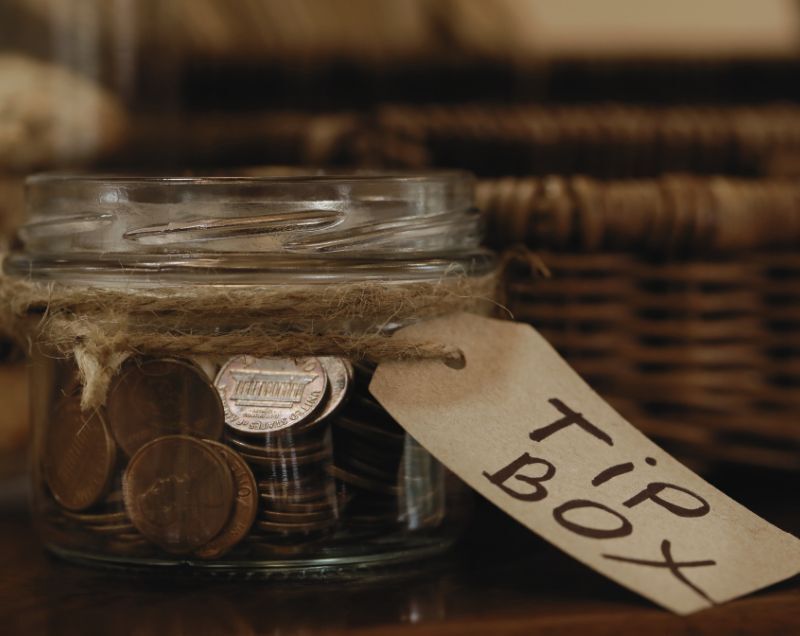The biggest driver of inflation these days is shelter, but if you own your own home and took out a mortgage more than three years ago, you’re not experiencing that. It’s the second-biggest driver that’s making us all a little crazy.
Energy isn’t it anymore – it was for a while, but those prices are declining now. Auto repair is getting up there, but you don’t take your car into the shop every week.
No, we’re talking about going out to eat. Even as the price of groceries has stabilized, the cost of dining away from home continues to climb more than 4% per year. And we think we know why: Tipping culture in America has gotten out of hand.
Tipping point
If you still believe 15% is a standard tip, we have one question for you: Where have you been going for fried clams since Howard Johnson’s closed?
The expected gratuity has inched up over the years. Today, if you live in a big city where hospitality is a major part of the economy, you’ll get an eyeroll if you leave anything less than 18%. Not long ago, 20% was considered the upper limit – what you gave for truly exceptional service. Now it’s as-you-do.
Part of this is a result of the Covid-19 pandemic. When we were all locked down, we found out who the essential workers were, and they weren’t always who we thought. Healthcare and public utility workers, sure, but it also turns out the people who brought us our food were suddenly having a moment. They were taking risks to sustain us and, when the restrictions were lifted and we could go back into restaurants, we were all just so happy to see each other that we were inspired to put that extra dollar or two in the till.
That was four years ago. We’re long since back to business-as-usual, but we’ve learned our lesson about how important food service is to the economy and our own sense of wellbeing. Sadly though, public policy has not kept up with public awareness. Americans who work for tips have a minimum wage of $2.13 per hour, compared to $7.25 per hour for everyone else, according to federal guidelines. (The wage is higher under most states’ laws.)
The 20% bonus – as well as the sub-minimum wage – is a distinctly American thing. The French term for a tip is pourbois. The German is Trinkgeld. Neither translates directly as “gratuity”. Rather, they mean “for a drink” and “drink money”. The implication is, “Thank you for being such an attentive host to my dining companions and me. Please let me treat you to a cocktail after work.” And so it’s a round-up to the next number ending in a zero rather than a calculated percentage. It also suggests an equality of social status between the server and the served rather than the big-spender American vibe, which is more akin to, “I’m the head honcho, and here’s how I reward you for catering to my whims.”

There’s no law
Can we all agree that, if you’re seated at a full-service restaurant where someone has already set your table and filled your water glass, you should leave a tip? Then let’s talk about what other situations do or don’t call for such generosity.
Our personal rule of thumb – and we don’t all have to agree on this – is: No tipping across a counter. Convenience store? Coffee to go? Pick-up orders? Sorry-not-sorry.
Is someone delivering the meal to our home? Sure, but that’s more of a pourbois. If we’re using our own plates and silverware and cleaning up after ourselves, then thanks for getting the food to us while it’s still warm.
But it’s not just food service workers with their hands out. If you don’t tip barbers, cabbies or hotel housekeepers, you might want to rethink that. But there are also plenty of service providers you shouldn’t have to tip: the wi-fi installer, the plumber, the electrician. They already make a decent wage.
That leaves a gap in the middle, though: What about the guys who deliver furniture or major appliances? While you wouldn’t even think of tipping the UPS, FedEx or Amazon driver, don’t you tip the U.S. Postal Service letter carrier every Christmas – so maybe you should. We’re not sold on the practice – just offering a thought exercise.

Check, please
When we first discussed the idea of an article on tipping culture in America, everyone on the Zoom call had exactly the same shake-my-head story: We’re each standing at the register at Starbucks with the price of our order already entered in, when the barista turns the reader around so that we can select an 18%, 20%, 22% or “Other” tip. Whatever we select, though, everyone else in line can see just how big a spender we are … or aren’t. That kind of social engineering is exactly why America needs to reexamine its tipping culture, and maybe the result will be a lowering of inflation in meals away from home.
Time magazine has an excellent history of tipping culture in America, and why we haven’t yet joined the rest of the world in just paying wait staff what they’re worth.
Ultimately, there’s little we as individual consumers can do about the status quo. You could choose to patronize no-tip restaurants, but they’re hard to find. We went online searching for a national directory of these, but the closest we came was a Google Sheets file nested in a sub-Reddit.
Another way of addressing the issue is to support legislation that erases the distinction between minimum wages for tipped and non-tipped employees. Seven states have already passed such laws, according to Workforce.com, while 15 others have taken meaningful measures to reduce the gap. You might want to check your state’s current policy and, if you don’t like it, see if any relevant bills are percolating in the assembly.
And while it’s tempting to stop tipping just to take a stand against the practice, remember that the gracious, attentive server who complimented your wine selection and laughed at your jokes might be making as little as $2.13 per hour without gratuities. No need to take your moral umbrage out on them.
The best revenge, as you’ve often heard, is living well. Maybe the only way out of the tipping dilemma is to rise above it. Tip the barista or not? Tip the wait staff 18% or 20? Get yourself into a situation where you can answer such questions with a hearty “Who cares?”
To that end, consider contacting Smith Anglin to schedule an appointment with an experienced, knowledgeable – and non-tipped – financial professional.




